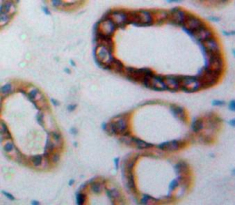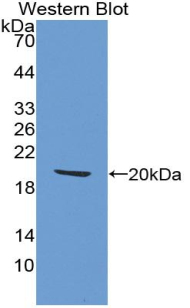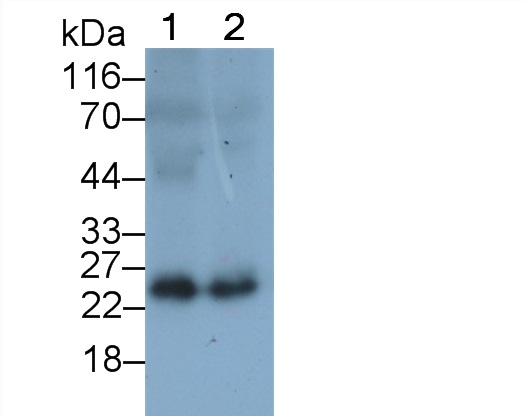Polyclonal Antibody to Heparin Binding Epidermal Growth Factor Like Growth Factor (HBEGF) 

HB-EGF; DTR; DTS; DTSF; HEGFL; Diphtheria Toxin Receptor; Proheparin-binding EGF-like growth factor; Diphtheria toxin receptor
Overview
Properties
- Product No.PAB479Mu01
- Organism SpeciesMus musculus (Mouse) Same name, Different species.
- ApplicationsWB
If the antibody is used in flow cytometry, please check FCM antibodies.
Research use only - DownloadInstruction Manual
- CategoryCytokineTumor immunityInfection immunity
- SourcePolyclonal antibody preparation, Host Rabbit
- Ig Type IgG, Potency n/a
- PurificationAntigen-specific affinity chromatography followed by Protein A affinity chromatography
- LabelNone
- Immunogen RPB479Mu01-Recombinant Heparin Binding Epidermal Growth Factor Like Growth Factor (HBEGF)
- Buffer FormulationPBS, pH7.4, containing 0.02% NaN3, 50% glycerol.
- TraitsLiquid, Concentration 0.5mg/mL
Sign into your account
Share a new citation as an author
Upload your experimental result
Review

Contact us
Please fill in the blank.
Specifity
The antibody is a rabbit polyclonal antibody raised against HBEGF. It has been selected for its ability to recognize HBEGF in immunohistochemical staining and western blotting.
Usage
Western blotting: 0.01-2µg/mL;
Optimal working dilutions must be determined by end user.
Storage
Store at 4°C for frequent use. Stored at -20°C in a manual defrost freezer for two year without detectable loss of activity. Avoid repeated freeze-thaw cycles.
Stability
The thermal stability is described by the loss rate. The loss rate was determined by accelerated thermal degradation test, that is, incubate the protein at 37°C for 48h, and no obvious degradation and precipitation were observed. The loss rate is less than 5% within the expiration date under appropriate storage condition.
Organism Species More: Sus scrofa; Porcine (Pig)Giveaways
Increment services
-
 Antibody Labeling Customized Service
Antibody Labeling Customized Service
-
 Protein A/G Purification Column
Protein A/G Purification Column
-
 Staining Solution for Cells and Tissue
Staining Solution for Cells and Tissue
-
 Positive Control for Antibody
Positive Control for Antibody
-
 Tissue/Sections Customized Service
Tissue/Sections Customized Service
-
 Phosphorylated Antibody Customized Service
Phosphorylated Antibody Customized Service
-
 Western Blot (WB) Experiment Service
Western Blot (WB) Experiment Service
-
 Immunohistochemistry (IHC) Experiment Service
Immunohistochemistry (IHC) Experiment Service
-
 Immunocytochemistry (ICC) Experiment Service
Immunocytochemistry (ICC) Experiment Service
-
 Flow Cytometry (FCM) Experiment Service
Flow Cytometry (FCM) Experiment Service
-
 Immunoprecipitation (IP) Experiment Service
Immunoprecipitation (IP) Experiment Service
-
 Immunofluorescence (IF) Experiment Service
Immunofluorescence (IF) Experiment Service
-
 Buffer
Buffer
-
 DAB Chromogen Kit
DAB Chromogen Kit
-
 SABC Kit
SABC Kit
-
 Long-arm Biotin Labeling Kit
Long-arm Biotin Labeling Kit
-
 Real Time PCR Experimental Service
Real Time PCR Experimental Service
Citations
- Astrocyte ERK phosphorylation precedes K+-induced swelling but follows hypotonicity-induced swelling.PubMed: 21118399
- Cypermethrin Induces Astrocyte Apoptosis by the Disruption of the Autocrine/Paracrine Mode of Epidermal Growth Factor Receptor SignalingPubmed: source
- 軽度炎症性膀胱痛マウスモデルの構築とNGFの関与Jstage:Source
- A novel method for assessing bladder-related pain reveals the involvement of nerve growth factor in painassociated with cyclophosphamide-induced chronic cystitis in mice.Pubmed:25820250
- 2 型糖尿病モデルラットにおける糖尿病性腎症の進行とHB-EGF の関連性17844
- Heparin-binding epidermal growth factor contributes to COPD disease severity by modulating airway fibrosis and pulmonary epithelial–mesenchymal transitionPubmed:29581578
- CD9 regulates keratinocyte migration by negatively modulating the sheddase activity of ADAM17
- Tumoral NOX4 recruits M2 tumor-associated macrophages via ROS/PI3K signaling-dependent various cytokine production to promote NSCLC growthPubmed: 30769285
- Polarization of ADAM17‐driven EGFR signalling in electric field‐guided collective migration of epidermal sheetsPubmed: 33164313
- 象牙芽細胞の枯渇は象牙芽細胞分化と象牙質形成を誘導する








